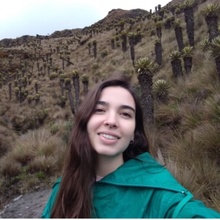
An Iowa Engineering graduate student researching flood prediction models has been selected for NASA’s competitive Future Investigators in NASA Earth and Space Science and Technology (FINESST) program.
Funding from the program will support Vanessa Robledo, a graduate research assistant at IIHR—Hydroscience and Engineering and a PhD candidate in civil and environmental engineering, as she investigates a strategy that combines weather predictions, rainstorms’ climatology, and near-real-time satellite observations to improve short-range precipitation forecasts, contributing to efforts to improve flash flood warnings.
Robledo’s project titled “Predictability of Precipitation Forcings for Flash Flood Forecasting” was one of only 55 selected proposals from the 565 submissions received by the Earth Science Division under NASA’s Research Opportunities in Space and Earth Sciences (ROSES) 2024 announcement.

"It's a tremendous honor and a testament to her hard work and vision," said Humberto Vergara, IIHR researcher and assistant professor of civil and environmental engineering. Vergara is Robledo's PhD advisor and was a key contributor in developing the national flash flood forecast model used operationally by the National Weather Service.
Robledo, who is from Manizales, Colombia, focuses her research on the predictability of extreme precipitation events in the occurrence of flash floods, with a goal to enhance the forecasting capabilities related to these sudden flood events.
Beyond its contribution to the scientific understanding of storm formation and movement, Robledo’s work has significant practical implications. Improved flash flood forecasting can lead to better prepared communities, more effective disaster response strategies, and reducing the loss of life and property during extreme weather events.
